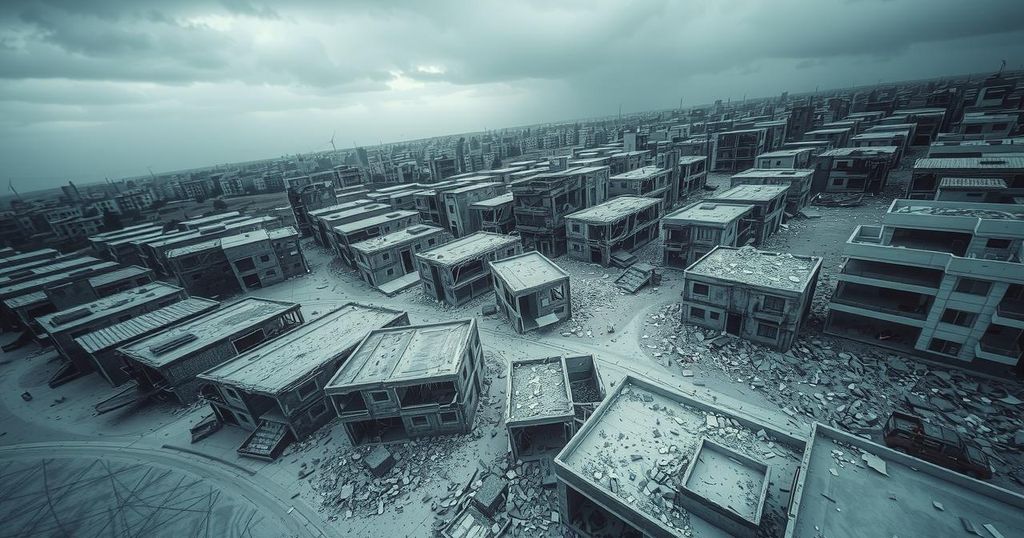Trump Proposes ‘Freedom Zone’ for Gaza Amid Stalled Ceasefire Talks
President Trump proposes making Gaza a “freedom zone” amid escalating violence and airstrikes from Israel, which resulted in significant casualty numbers. His remarks follow hopes for a ceasefire, yet talks appear stalled. The trip to the Gulf focused on investment deals, as humanitarian concerns in Gaza escalate due to ongoing blockades and military actions.
President Donald Trump recently suggested that the Gaza Strip should be designated as a “freedom zone.” This statement, made during a trip to Qatar, coincided with the intensification of Israel’s military offensive in Gaza, which has seen tragic losses including over 150 fatalities from airstrikes within just one day. Among those casualties were many children, raising significant international concern.
While Trump’s trip largely avoided direct mentions of the ongoing conflict, he addressed reporters after meetings with business figures in Qatar. “Gaza has been a territory of death and destruction for many years,” he asserted, proposing that the U.S. could facilitate development in the area. His comments align with the current Israeli government’s supports for plans that would permanently relocate Palestinians from Gaza. Notably, this approach has spurred accusations of ethnic cleansing from Hamas.
The human toll of the conflict has escalated dramatically, with Gaza’s health ministry reporting over 53,000 Palestinian deaths, including a staggering one-third being children. Hospitals continue to report increasing fatalities as Israel escalates its airstrikes during this week. Trump’s comments regarding the destruction emphasize the severity of the situation, as he described, “There is practically no building standing.”
As Trump arrived in the Middle East, hopes had been raised for a ceasefire, particularly following the release of U.S.-Israeli hostage Edan Alexander by Hamas. This occurrence followed direct discussions with the Trump administration that took place in Qatar, marking a notable engagement with Palestinian leadership, bypassing Israeli Prime Minister Benjamin Netanyahu. These talks, however, did not show any significant developments in ceasefire negotiations.
In parallel, as Trump engaged with Gulf leaders, Israeli officials remained resolute in their intentions regarding Gaza. Israel is preparing for further military operations while calling up reservists, indicating an increase in military presence. They have also introduced a plan to distribute aid to Palestinians — a move that U.N. organizations criticize as it risks increasing vulnerability and further displacing families amidst the blockade.
The blockade has persisted for over two months, significantly limiting access to essential aid, and leading to warnings from experts about looming famine affecting approximately half a million residents. International criticism of Israel’s tactics has grown in response to this humanitarian crisis.
Throughout his Gulf visit, Trump also focused on substantial investment agreements aimed at bolstering U.S. businesses, including a recent deal with Qatar worth up to 210 Boeing airplanes. His visit also spotlighted technology advancements and military sales in the region. In a speech to U.S. troops stationed at Al-Udeid Air Base, he stirred controversy by reiterating false claims about the 2020 election and labeled the Biden administration as “evil.”
Trump praised the military’s capabilities, stating they are the “greatest fighting force in the history of the world,” while making comments that sparked discontent regarding current military diversity initiatives. His trip will conclude with a visit to military bases in the UAE, continuing conversations around military and investment dealings in the broader region.
In summary, President Trump’s recent remarks about establishing a “freedom zone” in Gaza come amid escalating violence and mounting casualties from Israeli airstrikes. His ongoing discussions in the Middle East have largely centered on investment, bypassing direct engagement in the humanitarian crisis. While negotiations for a ceasefire were anticipated, they appear to be stalled, as tensions between Israel and Hamas continue unabated. Trump’s visit underscores a multifaceted approach involving both military commitments and potential economic initiatives, yet the humanitarian implications remain alarming.
Original Source: www.wxxinews.org




Post Comment